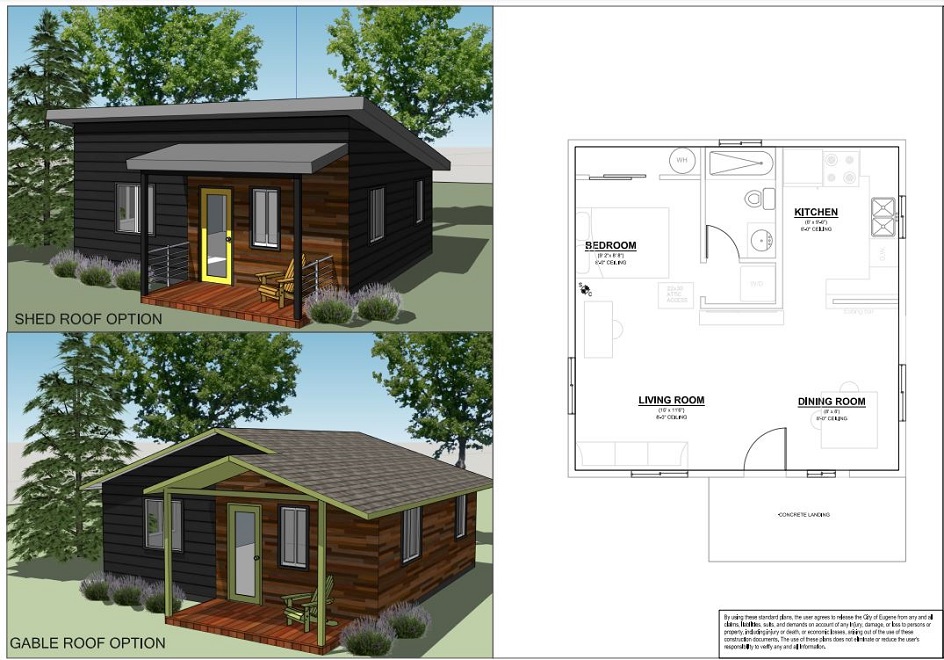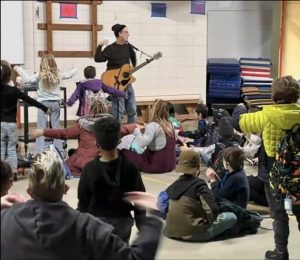Council bets on its latest approach to ADUs
5 min read
By a 6-2 vote, the Eugene City Council bet on its latest approach to Accessory Dwelling Units. Pre-approved plans are available at the City website.
As the City Council crafted its latest approach to accessory dwelling units, Councilor Mike Clark proposed a wager.
[00:00:08] Councilor Mike Clark: We’re going to be challenged on appeal and it will be remanded for a fourth time and it will be another year if it has to go to the Appeals Court. And I’ll take anybody at the table here that wants to make a wager on how the outcome goes.
[00:00:19] John Q: He offered three possible arguments for an appeal.
[00:00:23] Councilor Mike Clark: One. I don’t agree that the current staff proposal complies with our Comp (Comprehensive) Plan with regard to density. Number two. I think expediency has put some of our neighbors in an unfair position. I think that some of the pieces of this treat some households differently and that rubs me the wrong way. It makes them live with double density and it’s not fair.
[00:00:51] John Q: The third point was more technical, about providing advance notice to the state.
[00:00:56] Councilor Mike Clark: Some residents list some very specific bullet points about notice with regard to the staff’s position here, the DLCD particularly— we failed to notice DLCD properly.
[00:01:08] John Q: That’s the Department of Land Conservation and Development. He concluded:
[00:01:14] Councilor Mike Clark: There’s absolutely sufficient evidence that we’ll be remanded. And if anybody would like to wager on that, I’d be happy to take it.
Thank you for supporting
local citizen journalism
[00:01:22] John Q: Councilor Claire Syrett did not agree.
[00:01:25] Councilor Claire Syrett: I would urge us not to be swayed by the idea that this will get remanded. Certainly people have the right to appeal if they feel that there’s an appeal needed, but that doesn’t mean they’re going to win their appeal.
[00:01:40] John Q: She also questioned point number two, that one neighborhood was being treated unfairly.
[00:01:46] Councilor Claire Syrett: Based on the past performance of those constituents, I don’t think their goal is to help this go fast. I don’t think their goal is to help us create good housing policy. I think their goal is to delay, obfuscate, and get special treatment for a neighborhood that does not have any more pressures on it than my neighborhood, than the Friendly Area Neighborhood, than West Eugene. I don’t see any justification for this one neighborhood to be exempt from this code.
[00:02:27] Councilor Jennifer Yeh: This is actually a really exciting day, I think, because we’re able to move forward on something that, while it’s small in scope, you know, just dealing with ADUs, I think it really signals how we’re going to be moving forward in our housing discussion and how we’re going to be making space for more people and more housing. And I think that’s exciting and something we should be proud of. You know, my neighborhood is special to me, not because there’s some invisible line where you walk into it and all of a sudden it’s different than everywhere else in the city, but because that’s where I live. What I recognize is that the conditions are very similar, even if we’re in different places.
[00:03:08] Mayor Lucy Vinis: I want to comment on the fact that neighborhoods are unique and they each have their special values, but they are not autonomous. And the point of this state law is that they are not autonomous and that we are trying to create a predictable and consistent and fair landscape across the community. And so to suggest that specific neighborhoods that have exceptionalism can pull themselves out of this process when the intention is that citywide is a fair and consistent and predictable planning landscape. So I just want to say yes, we can honor what’s unique and special about your neighborhoods, but the intent of this law is not to give you autonomy, but to actually create predictability.
[00:03:53] Councilor Matt Keating: As the only counselor who is (a) a renter and (b) lives in an attached accessory dwelling unit, I’m saddened that I’m not hearing enthusiastic advocacy when it comes to livability of renters, and in particular, families that want to keep their familial units together in an affordable fashion through the creative use of accessory dwelling units. So when I hear livability in a neighborhood, I think about the livability of those who are renting as well as homeowners and those who are seeking (small-a) affordable housing solutions. Like in this example, ADUs.
[00:04:34] Councilor Greg Evans: In this conversation last couple of years, there has been a racial component that has been injected in it. That racial component applies only to Portland. It does not apply to the rest of the state. We do not have ghettos in Eugene. We do not have segregated communities in Eugene. You can buy a house anywhere you want to. The problems with race go deeper and they go into mortgage lending, mostly banks and insurance companies who typically charge higher rates to people of color when they’re trying to buy a home, and sometimes they add points to the loans. Let’s be clear about this. That is a non-issue in Eugene.
[00:05:25] Mayor Lucy Vinis: Okay. Thank you. With that final comment, all in favor of the main motion, please raise your hands. 1, 2, 3, 4, 5, 6, and opposed, two. Thank you. That passes. Thank you very much. And I, this took a little longer than we’d hoped, but I’m glad that we have resolved this. And I will say to all of you, echoing Jennifer’s comments, that really, this is important work. It’s been hard to do this work. We’re recognizing it’s one piece of a puzzle, but that the rest of that puzzle is coming to you also as council. And the community is looking to you to create opportunities for more housing to be constructed in this community. We have a vast number of constituents in this community who want us to do this work, who are glad that you have done this work today and look forward to the good work that you’ll do on housing in the future.
[00:06:20] John Q: The council bets on its latest version of ADUs, and it’s on to HB 2001.



